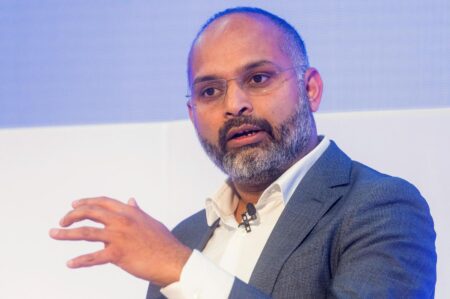Each year, financial services becomes a little more digital, a little more regulated, and a lot more complex. As the pace of change accelerates, the industry’s approach to leadership is being fundamentally rewired. A recent piece by Egon Zehnder underscored the unique role CHROs now play in navigating this transformation, balancing innovation, compliance, and culture. Meanwhile, True Search highlighted in a post the shifting AI talent landscape, suggesting that firms that fail to evolve will fall behind.
To understand how leadership hiring is evolving at the intersection of finance and technology, I spoke with Roopa Foley, Global Co-Head of Financial Services at Egon Zehnder, and Jonathan Pomeranz, Co-Head of Global Fintech & Financial Services Practices at True Search. Both firms work at the sharp end of executive hiring, shaping the future leadership teams of the world’s most powerful financial institutions.
What emerged from our conversations was clear: tomorrow’s financial services leaders must be equal parts operator, technologist, and change agent.
Roopa Foley, Global Co-Head of Financial Services at Egon Zehnder.
The Innovation Gap
“The pace of innovation is faster than what we’ve ever seen,” Foley explained. That innovation, she added, is increasingly driven by AI, data science, and cybersecurity, but the talent market hasn’t kept up. What banks want and what’s available are often misaligned.
Pomeranz echoed that sentiment. “There’s a cultural divergence,” he said. “For years, big banks wanted to hire from the Googles and Amazons of the world. But they quickly discovered that dropping someone from a high-growth tech culture into a risk-averse, regulated institution creates friction.”
The result? A more nuanced approach to hiring. “Now it’s about finding someone who’s ahead of you on the transformation journey, but not so far ahead that there’s organ rejection,” Pomeranz explained. In practice, that often means targeting leaders from fintechs, insurtechs, or even highly regulated sectors like healthcare.
Jonathan Pomeranz, Head of Global Fintech & Financial Services Practices at True Search.
New Frontiers in Risk and AI
If the old priority was revenue, the new priority is resilience. “There’s a spike in risk and compliance roles designed to manage internal AI use and guard against AI-driven financial crime,” Pomeranz said.
Foley confirmed that sentiment, identifying risk, regulatory, and compliance functions as the hottest hiring areas today, particularly at the intersection with technology.
Legacy banks, she noted, are trying to embed compliance earlier in customer processes rather than bolt it on after the fact. But that requires tech-savvy compliance leaders, and in institutions built on outdated systems, the talent lift is significant.
AI only compounds the challenge. “We’re starting to see Chief AI Officers and Heads of AI in risk and compliance,” Foley said. “Boards are asking: where does this role sit? How do we govern it?” In other words, AI isn’t just a technology issue, it’s a governance one.
The Leadership Skills Revolution
Interestingly, the technical skillset is no longer the primary differentiator. “In a space as dynamic as fintech, long-term leadership success depends on more than just domain expertise,” Pomeranz said. “We’re looking at how a candidate leads through complexity, how they’ve built followership, adapted their style as teams evolved, and shown up when things got tough.”
“We’re seeing a greater focus on how leaders lead,” said Foley. “It’s not just about what you’ve done, it’s about how you did it”. She outlined four dimensions that Egon Zehnder applies to evaluate potential in candidates:
- Curiosity – Are you willing to learn and improve?
- Insight – Can you process complex information and solve problems?
- Engagement – Do you connect with others on a human level?
- Determination – Are you resilient under pressure?
According to Pomeranz and Foley, behavioral interviews have become a core part of candidate assessments. “We’re not just asking if you increased revenue, we’re asking how you brought your team along and responded to challenges,” Foley said.
Pomeranz explained how it’s important to look at the full picture before selecting a new leader “Culture is key.The best candidates are the ones who understand where a firm is today and can meet it there, then help push it forward without breaking things.” True takes it one step further to ensure a seamless transition. “We also assess how they’ll complement the existing team, then pair them with a coach to help sharpen their soft skills and navigate the fast-moving shifts that come with the territory,” Pomeranz said.
The ‘Purple Unicorn’ Doesn’t Exist
Both Foley and Pomeranz warned against unrealistic expectations in hiring.
“There’s no such thing as the perfect candidate,” said Foley. “The important thing is understanding your must-haves. Is it continuity of culture? A turnaround mandate? Innovation at all costs? You can’t have it all.”
Pomeranz put it more bluntly: “Leaders with both deep tech and scaled financial services experience are unicorns. Most firms need to decide which leg to stand on, and what they’re willing to compromise.”
For example, some clients begin a CEO search convinced they want a tech outsider, only to end up hiring someone from fintech with just enough institutional fluency. “They thought they wanted Netflix, but they needed someone who could also talk to regulators,” Foley explained.
From CRO to CEO
Perhaps the most surprising trend is where new leaders are coming from. Pomeranz noted a shift toward “step-up” CEOs, candidates moving from Chief Revenue Officer or General Manager roles into the top job.
“The historic path was linear: COO or CFO to CEO. Now we’re seeing CROs and even product or tech leads move into the CEO role,” he said. The unifying factor is not title, but breadth: P&L ownership, cross-functional exposure, and the ability to lead through complexity.
This democratization of leadership opens the door for diverse candidates, especially those who bring a fresh lens to outdated business models. But, as both headhunters emphasized, leadership and adaptability remain the price of entry.
GenAI: From Buzz to Business
AI is quickly becoming embedded across job specs, even when not explicitly stated. “Every hire now has some element of digital transformation or AI embedded in it,” said Pomeranz. “Even if the role is not technical, leaders need to understand how AI changes the game.”
Still, AI maturity varies dramatically between firms. Some are running proof-of-concept pilots. Others are standing up entire operating models. That divergence affects who they hire, how they organize, and what they can realistically implement.
One area with immediate traction is internal AI governance. “We’re seeing roles created specifically to oversee AI usage internally, particularly in compliance and fraud prevention,” said Pomeranz.
Advice for Candidates: Mind the Culture
So what makes a candidate successful in today’s financial services world?
“You don’t get a pass on the so-called ‘soft’ leadership skills just because you’re from tech,” Foley cautioned. “You need to be adaptable, a great communicator, and resilient in the face of change.”
Pomeranz agreed. “The people who succeed are those who don’t bulldoze their ideas through. They understand politics. They build relationships. They know how to get things done in complex environments.”
For candidates coming from tech, that often means tempering pace with patience. “Your roadmap will take longer, and your changes will face scrutiny,” said Foley. “But if you can navigate that, the opportunity to create impact is enormous.”
The Mission Matters
Ultimately, both leaders stressed the importance of aligning candidates with a compelling mission.
“The top talent today isn’t job hunting,” Pomeranz said. “They’re mission hunting. They want to know what you stand for, what problem they’re solving, and how they’ll make an impact.”
That’s both a challenge and an opportunity for financial institutions. In an era of heightened expectations, by regulators, shareholders, and society at large, banks and fintechs must offer more than just a paycheck. They must offer purpose.
And for the right candidate, that might just be the most compelling offer of all.
For more like this on Forbes, check out Structural Talent Mismatch Cripples The Financial Services Industry and As Warren Buffett Steps Down, What’s Next For Financial Leadership?.
Read the full article here











